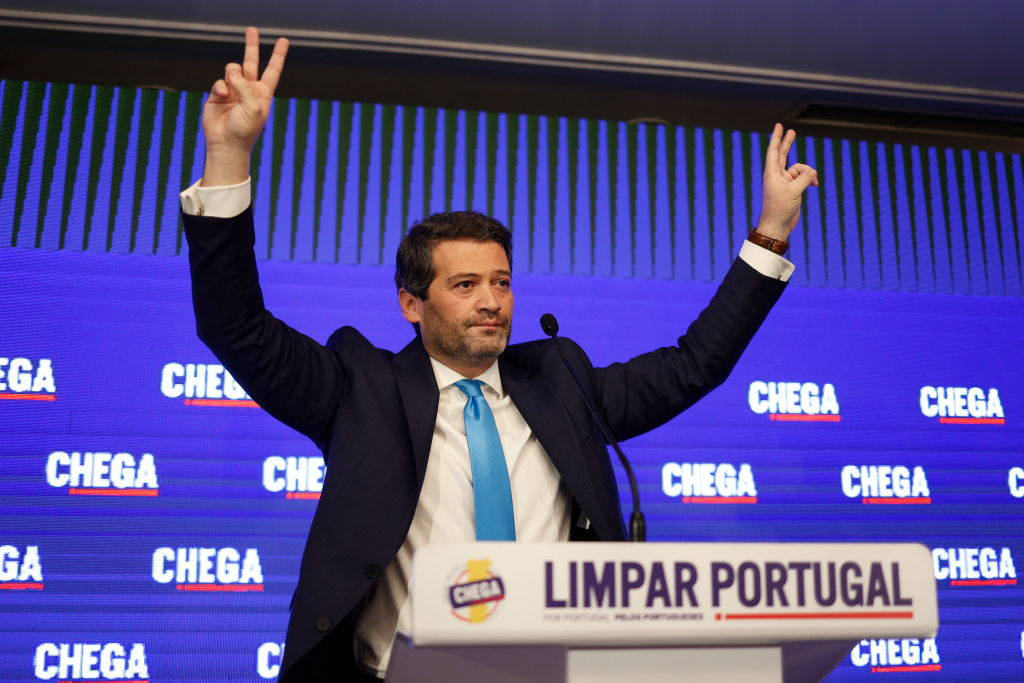Yesterday Portugal held a general election which shouldn’t have happened. Just two years ago, the ruling Socialists won a famous victory with 42% of the vote and 120 seats. That was enough for a majority government — until, that is, a scandal led to the resignation of the Prime Minister and to fresh elections.
The Socialist Party was heavily punished by the voters, losing a third of its seats and demonstrating that it’s not just the British Conservative Party which is capable of blowing a once-in-a-generation opportunity.
Yet what should have been an easy win for Portugal’s centre-right opposition fell short of expectations. The Democratic Alliance (AD) finished first, but by a painfully thin margin — less than 1% ahead of the Socialists and with just a couple more seats.
This underperformance has been blamed on a farcical mix-up between AD and ADN — the latter being the initials of a tiny fringe party that attracted a surprisingly high number of votes. However, a far bigger shock to the system is the surge in support for Chega — a Right-wing populist party whose name means “enough”.
In 2022, Chega won 7% of the vote and 12 seats — enough to come third but leaving it well behind the main parties of the centre-left and centre-right. This time, its vote share more than doubled to 18% and its seat tally quadrupled to 48. Portugal has three main parties now — and that presents a nightmare for the political establishment.
The “tri-polarisation” of Portuguese politics means that neither the centre-left nor the centre-right can command a majority on its own. Though the Democratic Alliance has the most seats (79), that’s still well short of what’s needed in the 230-seat parliament.
A deal with Chega would fix that, but there’s a catch. Luís Montenegro, the AD leader, has previously promised not to work with the populists. Like other European conservatives, he faces an excruciating dilemma: whether to break his promise and allow the Right-wingers a share of power, or to maintain the cordon sanitaire by doing a deal with the centre-left instead.
Elsewhere in Europe, the advance of populism has forced conservatives to work with their traditional social democrat opponents. For instance, in Germany a sequence of so-called “grand coalitions” kept Angela Merkel in power for most of her 16-year reign. Then there’s the European Parliament, which is controlled by a permanent power-sharing stitch-up between the centre-right, centre-left and liberal blocs.
However, constant compromise comes at a price. Whether it happens through formal deals or through an informal drift to the soggy centre, elections become less meaningful and governing establishments become calcified. Ongoing problems — such as uncontrolled immigration or Portugal’s truly appalling housing crisis — are left to fester and voter frustrations build up.
The irony is that the closed-shop centrism designed to exclude the populists can work to their advantage — as it has in Germany with the rise of the AfD and in the Netherlands with Geert Wilders’s recent election victory. Portugal is yet another warning to centrist politicians globally. Five years ago, Chega didn’t even exist — but today it has broken the national party system.
Of course, this isn’t the 1930s. Voters are not becoming more extreme. But they are losing patience with an establishment for whom chronic failure is no reason to relinquish power. Chega didn’t choose its name for nothing.











Join the discussion
Join like minded readers that support our journalism by becoming a paid subscriber
To join the discussion in the comments, become a paid subscriber.
Join like minded readers that support our journalism, read unlimited articles and enjoy other subscriber-only benefits.
Subscribe